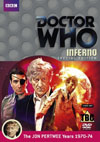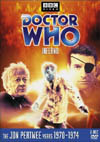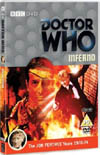Original DVD Extras include:
Special Edition DVD extras add:
"Listen to that! That's the sound of this planet screaming out its rage!"Just what metaphysical statement am I talking about? It has been said that our Earth was headed for destruction had it continued down the same timeline it was on throughout most of the 1970's, and that some time around 1981 - 1982, the human race chose a new path with a more successful resolution of old issues. Many of these old Jon Pertwee stories from the 70's showcase the sadness and frustration felt by those who grasped the reality of where we were headed socially: into a global apocalypse of conflict. Malcolm Hulke's work as a whole stands out particularly well on this issue. However, no one story truly encapsulates the idea better than "Inferno". I could elaborate a bit more on this point and many others, and spoil the plot for those who haven't seen the story, but here at Lyratek, we only do that in the In-depth Analysis version of a review. Click on it at your own peril.
"The TARDIS console slipped me sideways in time...."Also, if the Doctor's character can be seen to grow and develop throughout the 30+ year history of the show, it is here in "Inferno" that he demonstrates his biggest breakthrough. John Lucarotti's novelization of "The Massacre" (story no. 22) makes plain the early Doctor's "fatalist" view of time travel, a limiting trait that can be seen to bring out some of the most anti-heroic behaviour from the Doctor in nearly every old historical story of the program's history. The story dynamics improved as this old conundrum was abandoned along with the historical settings that usually brought it on. However, there's no better medicine for that fear of changing history than what the Doctor discovers during this tale. It still remains to be seen, however, how well the Doctor truly understands it, or how long this impression will last in him.
"Yes, of course, of course.... an infinite number of choices.... So free will is not an illusion after all!The Time Lords may have conquered Time and Space, but they still have something to learn about freedom of choice. "Inferno" makes a pioneer out of the Doctor, as he leads this exploration of a new frontier. And ultimately he is a much better hero because of this new philosophy.
"What did you expect? Some kind of space rocket, with Batman at the controls?"No complaints about the TARDIS in this story, with it making plot-critical appearances in six out of seven episodes. The familiar dematerialization sound is most often present and mixed in with other excellent Brian Hodgson creations both old and new, and for the story's only true materialization, the satisfyingly reversed and over-echoed sound from "The Invasion" (story no. 46) is used once again.
"Well, I didn't know he'd go off like that! The man's so infernally touchy!"As excellent as "Inferno" now is all the way through, it is interesting to watch the quality of the dialogue evolve with each episode. The guest characters are a bit on the stereotypical side in this story, which is not particularly a bad thing as the script and the production team know what to do with them, but they're not quite as fully or as sympathetically developed as those in "The Silurians" (story no. 52). Early on we get a lot of short-tempered clashing between them, and when faced with this situation, the Doctor appears to be choosing to aggravate matters often instead of coming to the point of his argument. He's only humanoid, after all.As the story runs its course, however, the dialogue gets better and better - the arguments get to the point, and rely less on empty style and flourish. Also, the characters here make much better progress at learning to see the world from the eyes of those around them.
"You know you really do look better with that moustache!"Nicholas Courtney's performance as the good old Brigadier is as enjoyable as ever, and he even manages to remain extremely charming when yelling an order to Sergeant Benton to drag in Professor Stahlman. Courtney also does a good job as the Brigade Leader, although this is not quite as polished.Jon Pertwee is at the top of his form all the way through, and Caroline John also turns in top notch performances. John Levene has appeared twice before as Sergeant Benton in "Doctor Who", but this is the story in which he truly earns his place as a series regular. We get to see a lot of what makes the good Benton tick, and from this story onwards, Benton would remain recognizable to the mainstream audience. Derek Newark, last seen in "An Unearthly Child" (story no. 1) as Za, is much more civilized and enjoyable here as Greg Sutton, and possibly even more energetic to boot. The director's wife, Sheila Dunn, has graduated from bit roles like Blossom LeFavre in "The Dalek Masterplan" (story no. 21) and voice-over roles like the receptionist computer in "The Invasion" (story no. 46) to bring Dr. Petra Williams to life, solidly and sympathetically. Dr. Williams is a strong character, deflecting Sutton's obnoxiously obvious early come-on in episode one with a great deal of charm, learning to take charge when necessary as the high position she has earned allows her to, and having the most crucial, proactive role of technical expertise in the main plot throughout one of the most critical episodes - she is a showcase of the best of women's lib, while remaining female in character and likeable to boot. Christopher Benjamin, perhaps better known for his role in "The Talons of Weng-Chiang" (story no. 91), is I think even better here in "Inferno" where he seems perfectly cast as the likeable, almost over-sensitive Sir Keith Gold. Olaf Pooley gives a tour-de-force performance as Professor / Director Stahlman. Even though the mad scientist is scripted to be a little one dimensional, he greatly succeeds as a character where Zaroff of "The Underwater Menace" (story no. 32), or even Robson of "Fury From the Deep" (story no. 42) do not. His motivation to succeed in producing energy for the British government is easily understandable, as is his emotional vulnerability if his theories should be proven wrong. And let's not forget the minor character of John Bromley (Ian Fairbairn), who manages to become something of an iconic symbol for the story. The image of him is captured on the cover of the edition of the novelization that I happen to have, helping him to stand out even more in my mind.
"There's nothing we can do! Is that right, Doctor?""You're seriously ill; you've been infected!"Once more, the third Doctor displays several of his least effective traits, but thankfully these are kept to something of a minimum in this story. His "Doomsayer" tactics are evident once more, emphasizing the eloquent statement of problems as though that is more of an achievement than it ever really is, and secondary hero Greg Sutton is quick to jump aboard the bandwagon with him. However, the unique plot of "Inferno" makes the "Doomsaying" not quite as out of place here as in other stories, and the Doctor does promote solutions as well where appropriate.
"Nothing like a nice happy ending, is there?" "Now come along, dear fellow. Put on a smile!" :-)The season comes to a close with a scene full of humour, good cheer, and comical conflict for the series' regulars. The Doctor attempts his usual heroes' exit, but thankfully the results are a little atypical this time around, lending to greater entertainment value. A great finish for a classic.
"....Degrees in medicine, physics, and a dozen other subjects. Just the sort of all-rounder I've been looking for."Season Seven has got to be one the most successful years of the Doctor Who program, especially in raising the maturity level of the show's content, scripts, and production values. Although the writers felt they needed to replace Liz Shaw with an assistant who requires constant, simpler explanations from the Doctor, I don't truly believe this really was to help the audience understand what was going on. Season Seven just didn't have that problem, and is probably the most easily understood year of stories in any of the first three Doctor's eras. Liz Shaw's assistant character worked extremely well for the audience, but probably required more effort from the writers. While they opted for a simpler and easier assistant character to write for, they also sadly left the peak of the maturity level of the scripts behind as well.....
Season Seven Rankings:
"Inferno" is now available on DVD and VHS video:
Comments on this article are welcome. You may contact the author from this page:
|
||||||||||||||||||||||||||||||||||||||||||||||||













